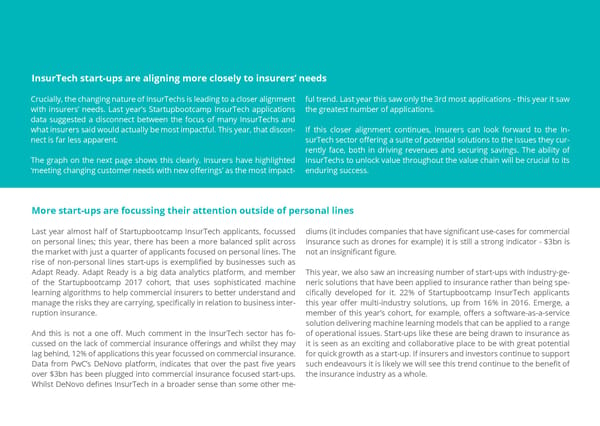19 InsurTech start-ups are aligning more closely to insurers’ needs Crucially, the changing nature of InsurTechs is leading to a closer alignment ful trend. Last year this saw only the 3rd most applications - this year it saw with insurers’ needs. Last year’s Startupbootcamp InsurTech applications the greatest number of applications. data suggested a disconnect between the focus of many InsurTechs and what insurers said would actually be most impactful. This year, that discon- If this closer alignment continues, insurers can look forward to the In- nect is far less apparent. surTech sector offering a suite of potential solutions to the issues they cur- rently face, both in driving revenues and securing savings. The ability of The graph on the next page shows this clearly. Insurers have highlighted InsurTechs to unlock value throughout the value chain will be crucial to its ‘meeting changing customer needs with new offerings’ as the most impact- enduring success. More start-ups are focussing their attention outside of personal lines Last year almost half of Startupbootcamp InsurTech applicants, focussed diums (it includes companies that have significant use-cases for commercial on personal lines; this year, there has been a more balanced split across insurance such as drones for example) it is still a strong indicator - $3bn is the market with just a quarter of applicants focused on personal lines. The not an insignificant figure. rise of non-personal lines start-ups is exemplified by businesses such as Adapt Ready. Adapt Ready is a big data analytics platform, and member This year, we also saw an increasing number of start-ups with industry-ge- of the Startupbootcamp 2017 cohort, that uses sophisticated machine neric solutions that have been applied to insurance rather than being spe- learning algorithms to help commercial insurers to better understand and cifically developed for it. 22% of Startupbootcamp InsurTech applicants manage the risks they are carrying, specifically in relation to business inter- this year offer multi-industry solutions, up from 16% in 2016. Emerge, a ruption insurance. member of this year’s cohort, for example, offers a software-as-a-service solution delivering machine learning models that can be applied to a range And this is not a one off. Much comment in the InsurTech sector has fo- of operational issues. Start-ups like these are being drawn to insurance as cussed on the lack of commercial insurance offerings and whilst they may it is seen as an exciting and collaborative place to be with great potential lag behind, 12% of applications this year focussed on commercial insurance. for quick growth as a start-up. If insurers and investors continue to support Data from PwC’s DeNovo platform, indicates that over the past five years such endeavours it is likely we will see this trend continue to the benefit of over $3bn has been plugged into commercial insurance focused start-ups. the insurance industry as a whole. Whilst DeNovo defines InsurTech in a broader sense than some other me-
 PwC & Startupbootcamp InsurTech: READY FOR TAKE OFF Page 18 Page 20
PwC & Startupbootcamp InsurTech: READY FOR TAKE OFF Page 18 Page 20